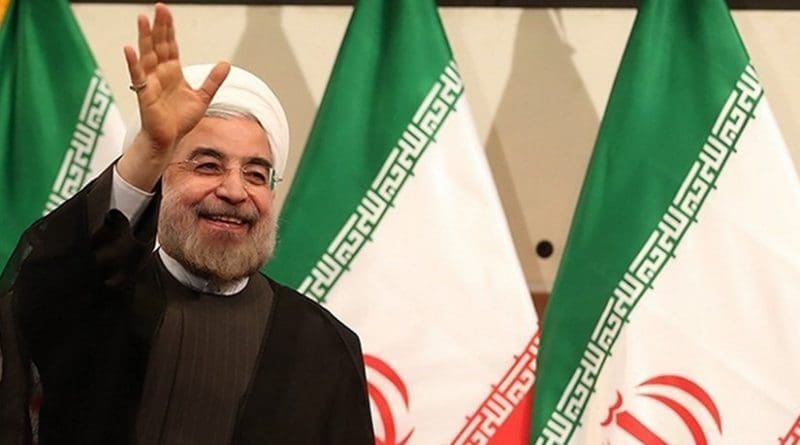The Two Irans – OpEd
The dynamics of the Iranian state make for an intriguing case study. Informed observers maintain that two strong internal forces are pursuing irreconcilable political objectives. On the one hand there is the reformist camp, concerned about the people’s welfare and willing to engage with the outside world. On the other, there is the “deep state”, led by Supreme Leader Ayatollah Ali Khamenei, supported by the powerful IRGC (Iranian Revolutionary Guards Corps), dedicated to upholding and strengthening the Islamic Revolution. It is the deep state that has complete dominance over the country’s political affairs, and can exercise its will in defiance of any contract or agreement enacted between Iran’s government and other countries.
For his own good reasons Khamenei facilitated the re-election in May 2017 of Hassan Rouhani as President for a second term in office. Rouhani drew a great deal of support from “progressives” within Iranian society, who believed he could – and would – carry through a programme of economic development aimed at improving the standard of living for the nation as a whole.
This belief was founded on the nuclear deal signed on 14 July 2015 between Iran and the permanent members of the UN Security Council plus Germany. For years the Iranian economy had been crippled by severe sanctions imposed by the UN and the USA for violating directives laid on Iran regarding its nuclear programme. With the grudging support of the Supreme Leader, Rouhani negotiated the deal under which a whole raft of sanctions were lifted, as a quid pro quo for Iran severely curtailing its nuclear development programme. Incidentally, no sooner was the deal signed, than Khamenei issued a statement hedging on some of its terms. “Even after this deal,” he pronounced, “our policy toward the arrogant US will not change.”
It is doubtful how high a priority Khamenei and the ruling Iranian élite placed on the economic wellbeing of the nation. The Supreme Leader had been fixated for a long time on a concept he dubbed “resistance economy” – an idea he introduced in 2011 in response to Western sanctions.
Resistance economy lays down measures aimed at overcoming the economic pressure of sanctions, such as creating domestic versions of foreign products, increasing barter trade, and smuggling. The idea has re-emerged in Iranian official rhetoric following the wave of unrest that swept the country in late December 2017 and early January 2018.
Khamanei himself, Iran’s religious bureaucracy, and leading IRGC officials were equivocal from the start about the negotiations leading to the nuclear deal with the West. They went along with it to win the lifting of sanctions, but once the sanctions were eased, assets unfrozen and substantial loans poured into Iran’s coffers, nothing was done to improve housing, education, public health, or transportation for the nation.
In a recent report, Radio Farda – which broadcasts to Iran under the aegis of Radio Liberty – maintained that many Iranians subsist on the bare minimum while their rulers live lavishly. “Khamenei suggests that the nation should consume less,” ran the report, “while the government wastes the country’s resources.” It cites in particular the chronic embezzlement and financial corruption, and the petro dollars poured into financing the IRGC. Resources were lavished on proxy wars in Syria and Yemen, and supporting IRGC’s ballistic missile programme. Millions more were given to terrorist factions such as Hezbollah and Hamas.
Khamenei and his supporters reject the idea that the civil unrest, which continued well into 2018, was an expression of dissatisfaction with the regime itself, despite the clearest indications during the uprisings that this is what they were. They blame Iran’s economic problems on “foreign enemies” and Rouhani’s administration, which they accuse of neglecting the principles of resistance economy.
The defenders of resistance economy are in fact isolationists. They oppose improved ties with the outside world, and are thus at total odds with one of the major concepts behind the nuclear deal – to restore Iran to the “family of nations”. Rouhani responded positively to this aspect of the deal, having recognized, together with his supporters, that the end result of resistance economy is to maintain the Iranian people in a permanent state of poverty and, for large numbers, misery.
The high hopes placed in Rouhani by the progressive movement were shattered with the emergence of Donald Trump as US president. At total odds with his predecessor, President Obama, Trump was fundamentally opposed to the deal, withdrew from it step by step, and has re-imposed the lifted sanctions.
Although Khamenei has asserted that the sanctions would make no difference to Iran’s economy – an assertion that may well prove correct, given the determination of the EU to circumvent them – Rouhani’s political position has been gravely weakened. His own support base feels frustrated, while the reformist movement has lost credibility among ordinary Iranians. The economic benefits they had hoped for never materialized. As for the Iranian establishment, they are now castigating Rouhani for the whole nuclear deal policy, and for placing any faith at all in the West.
Strangely the two Irans have shifted places. Rouhani and the progressives, once favoured by Washington, are now lobbying strongly against the US administration in the hope of a Democrat president in two years’ time.
The Iranian regime, on the other hand, is delighted that eight nations have been exempted from Trump’s embargo on Iranian oil. The concession was allowed on the proviso that income from these oil sales is placed in an escrow account usable only for food and other humanitarian imports. The élite might have chosen to use the petro dollars very differently, but the exemption frees up other sources of income for them to get their hands on.
In addition, in the belief that every cloud has a silver lining, Khamenei hopes the re-imposed sanctions will provide a long spell of isolation that will give Iran the chance to strengthen its adherence to the fundamentalist Islamism that lies at the root of the Revolution.

